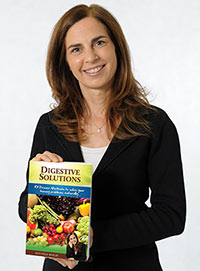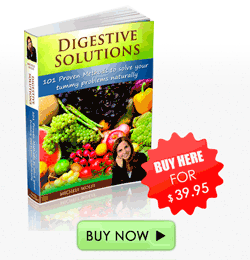
As seen on
By Michèle Wolff B.H.Sc Naturopathy, Dip. Colonics and Author of ‘Digestive Solutions’
Modern lifestyles expose our bodies to myriad toxins, through food (additives, preservatives, processed and junk foods), drink (alcohol and soft drinks), cigarettes, recreational drugs, medicines, environmental pollutants, cleaning products, make-up and more.
Our bodies have a natural ability to eliminate harmful substances through the liver, kidneys, gastrointestinal tract (stomach and bowel) and the skin. However, the abundance of toxins in our modern lives can place stress on our bodies – so it’s important we minimise exposure to these toxins so that our digestive system, and other elimination organs, can work most efficiently.
It’s well known that we can reduce toxic overload on our system by avoiding processed and junk foods, alcohol and caffeine. However, what you cook or prepare your food in can also be affecting your toxic intake. Ask yourself: are my pots and pans harmful to my health?
Avoid:
- Aluminium: Acidic foods like oranges, tomatoes, vinegars and salty foods cause leaching of aluminium as it is soft and highly reactive. Aluminium can build up in your body from various sources such as baking powder, salt, deodorant and antacids. Some people are more sensitive to aluminium than others, especially if their digestive systems are not detoxifying it out of the body effectively. Aluminium is the third most abundant element in the earth’s crust and is found in the air, water and soil, so it’s best to take every opportunity to avoid exposure.Anodised aluminium cookware has become a popular alternative. The anodisation – placing the aluminium in a chemical solution and exposing it to electric currents to build up a hard, non-reactive surface – locks in the aluminium, but can break down over time.
- Non-stick coated vessels: The fluoropolymer coatings used to prevent sticking can result in toxic fumes when cooked at high temperatures, According to the Environmental Working Group, non-stick coatings can “reach 700o Fahrenheit [371o Celsius] in as little as 3-5 minutes, releasing 15 toxic gases and chemicals, including two carcinogens.” At high heat the fluoropolymers used in non-stick finishes release various toxic substances and at least one greenhouse gas. There is still research being conducted on its potential harmful effects. If you are using non-stick coated cooking vessels, never leave the stove unattended as toxicity becomes worse with overcooked or overheated food.
- Copper: Copper leaches into food when heated, leading the FDA in the US to caution against using unlined copper pans for general use. Coated copper can lose its protective layer if damaged or scoured, and the protective layer can also leach into your food.
Use:
- Enamel-lined cast iron: Cast iron pans are heavy and thick and provide even heat distribution. It is easy to clean and long-lasting, although take care to avoid scratching the enamel.
- Ceramic: Pots made from unglazed clay are generally healthy, soaked in water before and during cooking. These pots help increase tenderness and natural flavours of a dish. There are no strict laws in Australia regulating the glaze used on ceramic plates and bowls, but any that is yellow, orange or red is likely to contain the heavy metals cadmium or lead – white glaze is best.
- Glass: Lead-free glass cookware is made from silica or sand and does not leech into food – from this perspective it is the safest cookware. However there are some disadvantages due to inefficient heat distribution, potential for the glass breaking, and loss of nutrients due to the light from the cooking element destroying light-sensitive nutrients. Opaque cookware avoids this problem.
- Stainless steel: Pots with heavy bases are safe and durable and distribute heat evenly, however, it’s important to avoid using abrasives for cleaning stainless steel.
- Titanium: Beneficial titanium metal properties gives this cookware many advantages, including being healthier, lighter, long-lasting, quick to heat and easy to clean. However, titanium pans often have non-stick coating, so check with the manufacturer. Titanium cookware that is safe is usually silver in colour.
- Safe chemical-free cookware: There are some non-stick pans that have the coating baked on, which are safer to cook with, like those with a mineral base. Non-stick nano surfaces, bonded at extreme temperatures, are also a good option. Ecolon coatings such as Neoflam are eco-friendly and free of chemicals.
Michèle Wolff is a leading health practitioner and a qualified naturopath, nutritionist, herbalist and nurse, owner of Ultimate Detox Solutions www.detoxspecialist.com.au. Her new book ‘Digestive Solutions – 101 Proven Methods to Solve Your Tummy Problems Naturally’ is available from bookstores and good online booksellers. Visit www.digestivesolutions.com.au RRP $39.95





